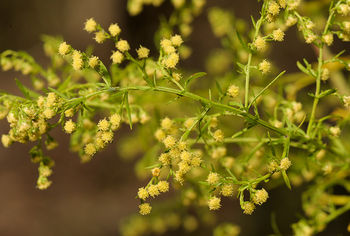Artemisia annua
Other Names: Sweet Annie, Absinthe Sauvage, Ajenjo Silvestre, Annual Mugwort, Annual Wormwood, Armoise Amère, Armoise Annuelle, Artémise, Artemisia annua, Artemisia, Artemisinin, Chinese Wormwood, Ching-hao, Herba Artemisiae Annuae, Herbe aux Cent Goûts, Huang Hua Guo, Qing Hao, Qinghaosu, Sourcil de Lune, Sweet Wormwood.
Sweet Annie is an herb. The parts that grow above the ground are used to make medicine.
See also :
Special Precautions of Artemisia annua
- Don't confuse with Wormseed and not to be confused with Artemisia vulgaris (common Wormwood or Artemisia absinthium)
- Sweet Annie seems safe for most adults when taken by mouth. The tea of sweet Annie might cause upset stomach and vomiting. It might also cause an allergic reaction in some people including a rash and cough.
- There has been one report of liver damage in a person who took doses of sweet Annie that were too large. But liver damage has not been reported in people taking typical doses.
- Not enough is known about the safety of applying sweet Annie directly to the skin.
- Pregnancy and breast-feeding: Sweet Annie is LIKELY UNSAFE when taken by mouth during pregnancy. Animal studies show that drugs made in the laboratory from artemisinin, a chemical found in sweet Annie, can cause death of the fetus or birth defects when used early in the pregnancy. The safety of using sweet Annie during the last 6 months of pregnancy is not known. Nevertheless, the World Health Organization considers drugs made in the laboratory from artemisinin acceptable to use during the last six months of pregnancy, if no other malaria treatment is available.
- The safety of using sweet Annie during breast-feeding is not known. Stay on the safe side and avoid use.
- Allergy to ragweed and related plants: Sweet Annie may cause an allergic reaction in people who are sensitive to the Asteraceae/Compositae family. Members of this family include ragweed, chrysanthemums, marigolds, daisies, and many others. If you have allergies, be sure to check with your healthcare provider before taking sweet Annie.
The benefits of Artemisia annua are
Sweet Annie contains a chemical called artemisinin that seems to be effective against the parasites that cause malaria. Some drug manufacturers make anti-malarial medications from artemisinin that they have modified in the laboratory.Sweet Annie should not be used alone for malaria since it may only inactivate the parasites that cause malaria, not actually kill them. The amount of artemisinin in sweet Annie might be too small to kill all the parasites that cause malaria, but large enough to make these parasites resistant to further treatment with more powerful malaria drugs that also contain artemisinin.Many researchers are investigating new ways to increase the amount of artemisinin in sweet Annie.
- Yin Chen Hao and Qing Hao are bitter and cold and have a light, fragrant smell.
- Both are commonly used for transforming Damp-Heat, eliminating Exterior Damp-Heat and treating symptoms such as heaviness of the head, body and limbs, a sense of constriction in the chest, nausea, loss of appetite, distension in the abdomen and intermittent fever and chills. These symptoms are often seen in sunstroke, summer cold infections, influenza, acute enteritis and dysentery.
- Both of them can clear Damp-Heat from the Liver and Gall Bladder and relieve jaundice in hepatitis or malaria, in which Damp-Heat accumulates in the Middle Jiao and disturbs the secretion of bile.
- These two herbs can also reduce low-grade fever and are used for Interior disorders, but the functions and applications are different.
- Malaria. Taking sweet Annie tea for 4-7 days might improve symptoms and decrease the number of active parasites in people with malaria. The tea should not be boiled, because heat will destroy the chemical that seems to fight malaria. There is some concern that if sweet Annie tea is used alone instead of in combination with usual malaria treatments it might only inactivate the malaria parasites, not actually kill them.
- AIDS-related infections : People with AIDS sometimes use sweet Annie to prevent an often fatal type of lung infection called pneumocystis pneumonia (PCP) that is caused by a fungus.
- Anorexia.
- Arthritis.
- Bacterial infections.
- Fungal infections.
- Bruises.
- Cancer : See Artemisinin. In studies involving leukemia, breast, bowel and prostate cancer cells, the scientists say the compound was both effective at killing the cancer while preserving the non-cancerous cells. Moreover some cancer treatments -- for example, those that are used to treat leukemia -- can result in an excess of yeast, while some doctors feel that excess yeast can even be a cause of cancer. Wormwood has properties that are directly anti-cancerous.
- Common cold.
- Constipation.
- Diarrhea.
- Fever.
- Gallbladder disorders.
- Upset stomach.
- Yellowing of the skin (jaundice).
- Night sweats.
- Painful menstruation.
- Psoriasis.
- Scabies.
- Sprains.
- Tuberculosis : Artemisinin is capable of blocking a defensive mechanism used by the TB-causing bacterium, Mycobacterium tuberculosis (Mtb).
